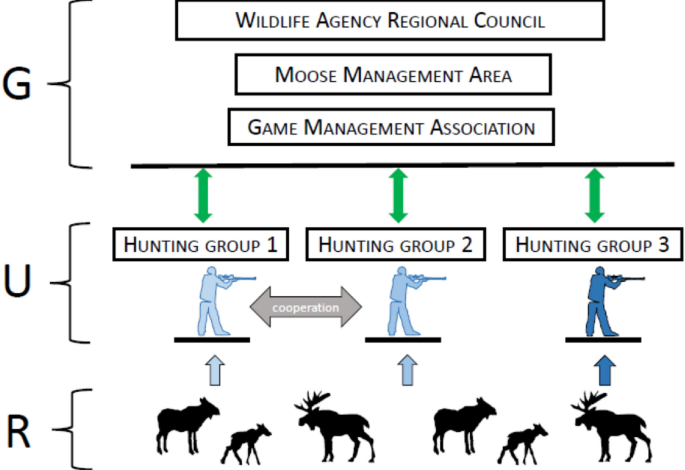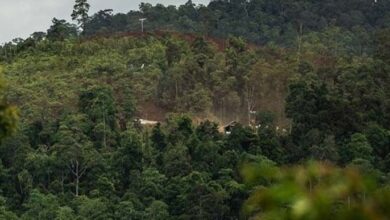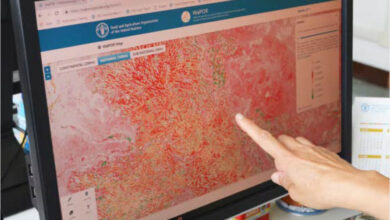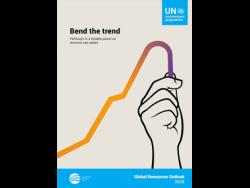Factors promoting hunting groups’ sustainable harvest of moose in a co-management system

Hardin, G. The tragedy of the commons: The population problem has no technical solution; it requires a fundamental extension in morality. Science 162, 1243–1248 (1968).
Ostrom, E. A diagnostic approach for going beyond panaceas. Proc. Natl. Acad. Sci. USA 104, 15181–15187. https://doi.org/10.1073/pnas.0702288104 (2007).
Ostrom, E. Understanding Institutional Diversity (Princeton University Press, 2009).
Brondizio, E. S., Ostrom, E. & Young, O. R. Connectivity and the governance of multilevel social-ecological systems: The role of social capital. Annu. Rev. Environ. Resour. 34, 253–278 (2009).
Vogt, J. M., Epstein, G. B., Mincey, S. K., Fischer, B. C. & McCord, P. Putting the” E” in SES: Unpacking the ecology in the Ostrom sociale-cological system framework. Ecol. Soc. 20, 55 (2015).
Cumming, G. S. et al. Advancing understanding of natural resource governance: A post-Ostrom research agenda. Curr. Opin. Environ. Sustain. 44, 26–34. https://doi.org/10.1016/j.cosust.2020.02.005 (2020).
Bodin, Ö. Collaborative environmental governance: Achieving collective action in social-ecological systems. Science 357, 1–20. https://doi.org/10.1126/science.aan1114 (2017).
Smith, H., Marrocoli, S., Garcia Lozano, A. & Basurto, X. Hunting for common ground between wildlife governance and commons scholarship. Conserv. Biol. 33, 9–21 (2019).
Ostrom, E. A general framework for analyzing sustainability of social-ecological systems. Science 325, 419–422. https://doi.org/10.1126/science.1172133 (2009).
McGinnis, M. D. & Ostrom, E. Social-ecological system framework: Initial changes and continuing challenges. Ecol. Soc. https://doi.org/10.5751/ES-06387-190230 (2014).
Fleischman, F. et al. Governing large-scale social-ecological systems: Lessons from five cases. Int. J. Commons 8, 428–456 (2014).
Partelow, S. A review of the social-ecological systems framework: Applications, methods, modifications, and challenges. Ecol. Soc. https://doi.org/10.5751/ES-10594-230436 (2018).
Agrawal, A. Common property institutions and sustainable governance of resources. World Dev. 29, 1649–1672. https://doi.org/10.1016/S0305-750X(01)00063-8 (2001).
Dressel, S., Johansson, M., Ericsson, G. & Sandström, C. Perceived adaptive capacity within a multi-level governance setting: The role of bonding, bridging, and linking social capital. Environ. Sci. Policy 104, 88–97. https://doi.org/10.1016/J.ENVSCI.2019.11.011 (2020).
Acheson, J. M. Institutional failure in resource management. Annu. Rev. Anthropol. 35, 117–134 (2006).
Walker, B. et al. Looming global-scale failures and missing institutions. Science 325, 1345–1346 (2009).
Macneil, M. A. & Cinner, J. E. Hierarchical livelihood outcomes among co-managed fisheries. Glob. Environ. Change 23, 1393–1401. https://doi.org/10.1016/j.gloenvcha.2013.04.003 (2013).
Rist, L., Felton, A., Samuelsson, L., Sandström, C. & Rosvall, O. A new paradigm for adaptive management. Ecol. Soc. 18, 63 (2013).
Bodin, Ö., Sandström, A. & Crona, B. Collaborative networks for effective ecosystem-based management: A set of working hypotheses. Policy Stud. J. 45, 289–314 (2017).
Agrawal, A. & Benson, C. S. Common property theory and resource governance institutions: Strengthening explanations of multiple outcomes. Environ. Conserv. 38, 199–210 (2011).
Blaikie, P. Is small really beautiful? Community-based natural resource management in Malawi and Botswana. World Dev. 34, 1942–1957 (2006).
d’Armengol, L., Castillo, M. P., Ruiz-Mallén, I. & Corbera, E. A systematic review of co-managed small-scale fisheries: Social diversity and adaptive management improve outcomes. Glob. Environ. Change 52, 212–225 (2018).
Dressel, S., Sjölander-Lindqvist, A., Johansson, M., Ericsson, G. & Sandström, C. Achieving social and ecological outcomes in collaborative environmental governance: Good examples from Swedish moose management. Sustainability 13, 1–21. https://doi.org/10.3390/SU13042329 (2021).
Dressel, S., Ericsson, G. & Sandström, C. Mapping social-ecological systems to understand the challenges underlying wildlife management. Environ. Sci. Policy 84, 105–112. https://doi.org/10.1016/j.envsci.2018.03.007 (2018).
Plummer, R. & Hashimoto, A. Adaptive co-management and the need for situated thinking in collaborative conservation. Hum. Dimens. Wildl. 16, 222–235 (2011).
Cox, M. Advancing the diagnostic analysis of environmental problems. Int. J. Commons 5, 346–363 (2011).
Cumming, G. S., Olsson, P., Holling, C. S. & Chapin, F. S. Resilience, experimentation, and scale mismatches in social-ecological landscapes. Landsc. Ecol. https://doi.org/10.1007/s10980-012-9725-4 (2012).
Apollonio, M. et al. Challenges and science-based implications for modern management and conservation of European ungulate populations. Mamm. Res. 62, 209–217 (2017).
Niemi, M. et al. Temporal patterns of moose-vehicle collisions with and without personal injuries. Accid. Anal. Prev. 98, 167–173 (2017).
Matala, J. et al. Hirvieläinten vaikutuksia yhteiskuntaan, elinkeinoihin ja ekosysteemiin. (2021).
Dressel, S. et al. Evaluating the outcomes of collaborative wildlife governance: The role of social-ecological system context and collaboration dynamics. Land Use Policy 99, 105028–105028. https://doi.org/10.1016/J.LANDUSEPOL.2020.105028 (2020).
Holling, C. S. & Walters, C. Adaptive environmental assessment and management. (1978).
Plummer, R. et al. Adaptive comanagement: A systematic review and analysis. Ecol. Soc. 17, 11 (2012).
Fryxell, J. M., Sinclair, A. R. & Caughley, G. Wildlife Ecology, Conservation, and Management (Wiley, 2014).
Levin, S. et al. Social-ecological systems as complex adaptive systems: Modeling and policy implications. Environ. Dev. Econ. 18, 111–132 (2013).
Di Minin, E. et al. Consequences of recreational hunting for biodiversity conservation and livelihoods. One Earth 4, 238–253 (2021).
Butler, D. asreml: Fits the Linear Mixed Model. R package version 4.1.0.176. www.vsni.co.uk (2022).
Löyttyniemi, K. & Lääperi, A. Moose in Finnish Forestry (Reports-University of Helsinki, 1988).
Agrawal, A. & Chhatre, A. Explaining success on the commons: Community forest governance in the Indian Himalaya. World Dev. 34, 149–166 (2006).
Nygrén, T. The history of moose in Finland. Swedish Wildlife Research (Sweden) (1987).
Axelrod, R. & Hamilton, W. D. The evolution of cooperation. Science 211, 1390–1396 (1981).
Nowak, M. A. Five rules for the evolution of cooperation. Science 314, 1560–1563 (2006).
Béné, C. et al. Power struggle, dispute and alliance over local resources: Analyzing ‘democratic’decentralization of natural resources through the lenses of Africa inland fisheries. World Dev. 37, 1935–1950 (2009).
Sobel, J. Can we trust social capital?. J. Econ. Lit. 40, 139–154 (2002).
Kahsay, G. A. & Medhin, H. Leader turnover and forest management outcomes: Micro-level evidence from Ethiopia. World Dev. 127, 104765 (2020).
Lockwood, M., Davidson, J., Curtis, A., Stratford, E. & Griffith, R. Governance principles for natural resource management. Soc. Nat. Resour. 23, 986–1001 (2010).
Dietz, T., Ostrom, E. & Stern, P. C. The struggle to govern the commons. Science 302, 1907–1912 (2003).
Ostrom, E., Ahn, T. K. & Kingdom, U. A social science perspective on social capital. Sociol. J. Br. Sociol. Assoc. 65, 812–855 (2001).
Rankin, D. J., Bargum, K. & Kokko, H. The tragedy of the commons in evolutionary biology. Trends Ecol. Evol. 22, 643–651. https://doi.org/10.1016/J.TREE.2007.07.009 (2007).



